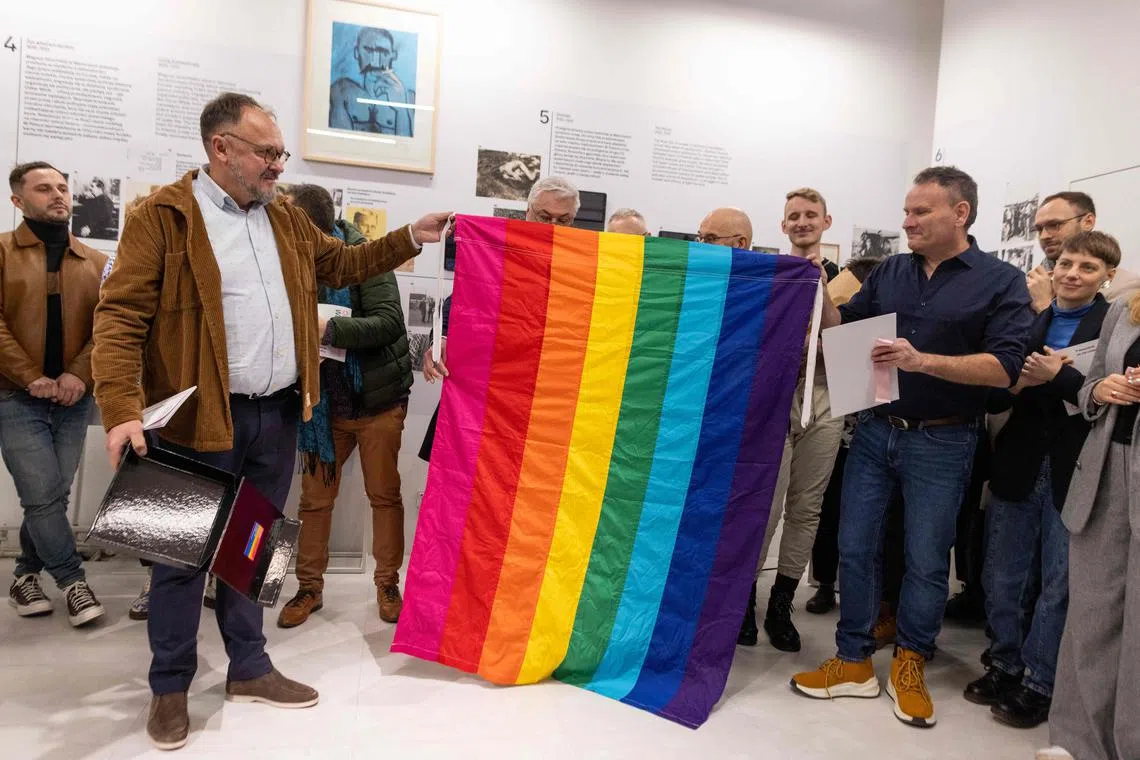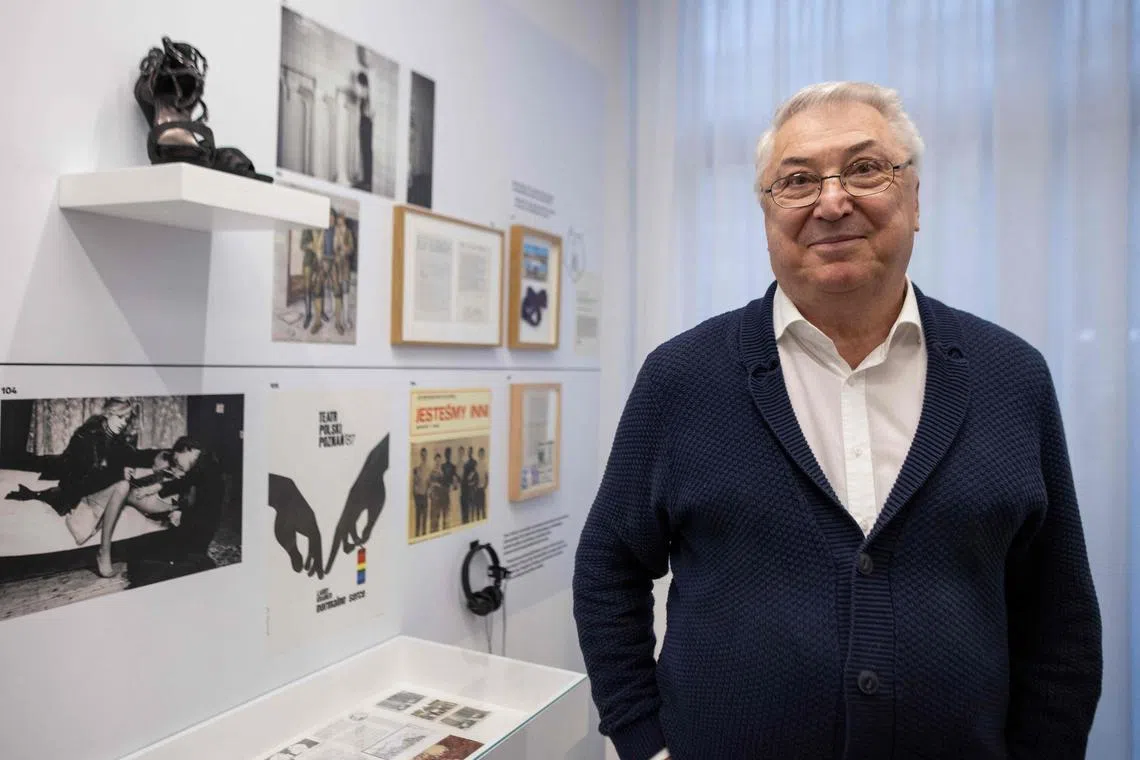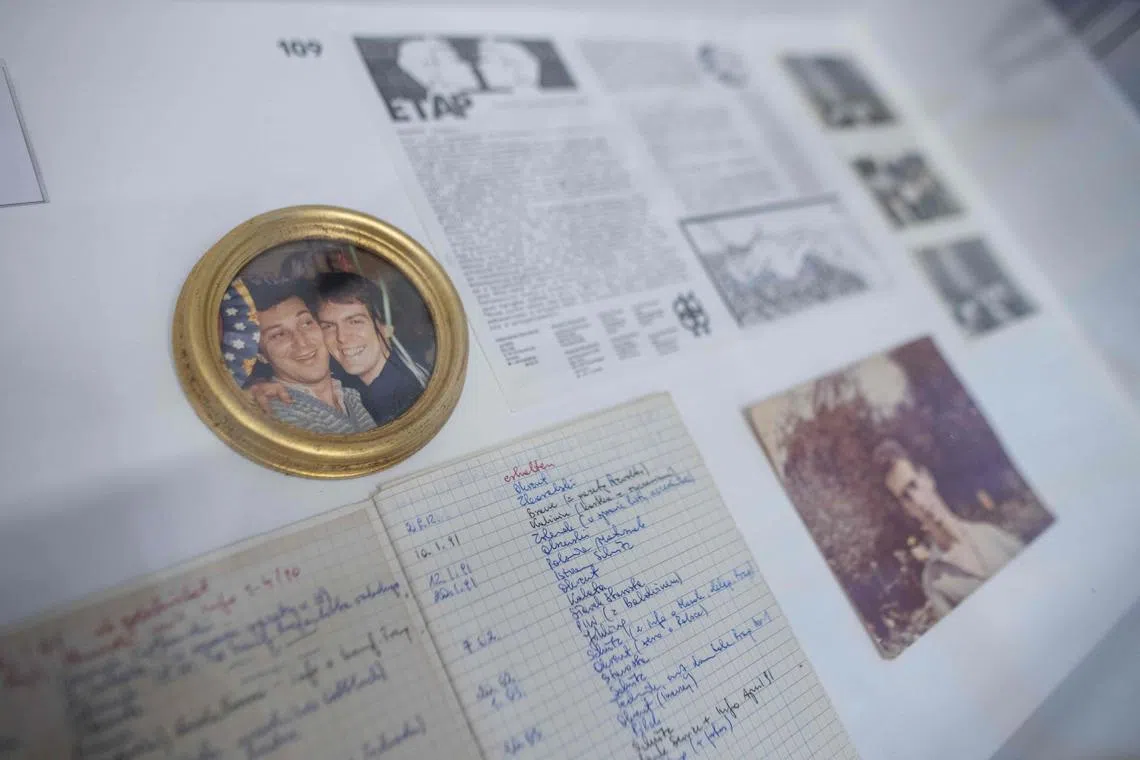‘No longer afraid’: Poland’s first queer museum opens
Sign up now: Get ST's newsletters delivered to your inbox

The ribbon-cutting ceremony gathered dozens of LGBTQ Polish campaigners, some of whom have spent decades fighting for equal rights.
PHOTO: AFP
WARSAW - Amid the bustle of Warsaw’s busiest street with trams whizzing by, Poland’s first LGBTQ museum opened on Dec 6, dubbed a landmark moment by the community still striving for full legal rights.
Tucked between a kebab shop and a second-hand clothes store, it hosts almost 150 artefacts offering a timeline of Poland’s LGBTQ movement’s struggle for recognition.
Its interior is minimalist, verging on the austere.
The institution was set up by non-profit rights group Lambda and is the first of a kind “in all of post-communist Europe”, said its director Krzysztof Kliszczynski. He was “overjoyed” to see it coming to life.
Its exhibits trace the history of LGBTQ people living in Poland back to the 16th century, illustrating it with letters, pictures, and early examples of activism – often clandestine out of fear of oppression.
The ribbon-cutting ceremony gathered dozens of LGBTQ Polish campaigners, some of whom have spent decades fighting for equal rights.
Among them was Mr Andrzej Selerowicz, who in 1983 launched the first Polish newsletter for gay men.

LGBTQ rights activist Andrzej Selerowicz at the opening of Poland’s first Queer Museum in Warsaw on Dec 6.
PHOTO: AFP
Poring over a glass case in the Warsaw museum, Mr Selerowicz pointed at a pocket-sized, circular picture showing two young men, hugging cheek to cheek, smiling to the camera.
“This is a photo of me and my partner to the present moment, taken 45 years ago,” said the 76-year-old author and translator who lives in Vienna.
He came to Warsaw specifically for the ceremony, invited as one of the pioneers of the LGBTQ rights movement, alongside Mr Ryszard Kisiel, who also started his activism in the 1980s.

A picture showing LGBTQ rights activist Andrzej Selerowicz (left) and his partner in their young age is exhibited among other items during the opening of Poland’s first Queer Museum on Dec 6.
PHOTO: AFP
Mr Kisiel, 76, applauded by the museum’s staff and fellow campaigners as he entered the building, smiled coyly when asked about his role in creating the opening exhibition.
“I take some credit for that,” he chuckled. He, like Mr Selerowicz, donated his memorabilia for the display, including “the leaflet on the rules of safe sex that I made almost 40 years ago”.
Researchers say it has not always been easy to gather artefacts documenting the often forgotten struggle of the LGBTQ community.
“A huge part of this queer history is also very private... and very often destroyed after the death of these people, and often deliberately so,” said University of Warsaw historian Piotr Laskowski.
Among the objects on display was a handcrafted copy of a magazine from 1956, previously unknown to LGBTQ campaigners and researchers. It was only brought to light when offered to the museum.
“That is also why this museum is here... so that memory is never thrown away again – the memory of us that often ended up in the rubbish heaps,” Mr Kliszczynski said.
As they hailed the creation of the museum as another milestone in the history of LGBTQ people in Poland, they also pointed to one cloud on the horizon.
Poland’s main ruling party had pledged to legalise civil unions. Almost a year into its tenure, however, same-sex couples still cannot marry or register their partnerships in this largely Catholic country.
Last week, a United Nations-mandated expert urged Poland to swiftly amend laws to protect LGBTQ people against discrimination and violence, lamenting the slow pace of reforms from the pro-European Union government.
“I can’t comprehend why Poland is at the tail end of the whole of Europe, when even in quite conservative southern European countries civil unions are already introduced,” said Mr Selerowicz.
Impatient for change, the campaigners were adamant that they no longer feared homophobic attacks on the centrally located venue.
“Enough of being afraid... We can no longer be afraid,” said Mr Kliszczynski.
“And if someone sprays our shop window, I will personally remove the paint,” he added. AFP


